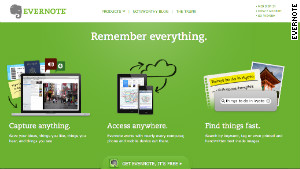One of Facebook's recent
overhauls saw the addition of a timeline to help users build a
chronological narrative of their lives. Kevin Systrom, co-founder of
photo sharing site Instagram, said this week he wants to give his users
better access to their older images.
But as we increasingly
rely on digital services as a repository for our life stories, is there
any guarantee that we will be able to access them in years to come?
Multibillion dollar
businesses such as Facebook and Google might seem like rock solid
cornerstones of the Internet at the moment, but fortunes change and
leviathans can and do go out of business. And a scroll through the fine
print of most social media sites' terms reveals no mention of an
obligation to safeguard our data.
With such a large
question mark hanging over the tech industry, it was only a matter of
time before someone smelled a business opportunity.
One of those people is Phil Libin, CEO of Evernote, a service that allows users to archive images, documents and other data.

Libin made headlines at tech conference LeWeb London this week when he revealed that Evernote has 34 million users,
of whom 1.4 million are paying customers -- up sharply from the 25
million users and 1 million paying customers he had announced in May.
Three-quarters of these new users are coming from mobile devices, he
said.
Already sitting on a $1
billion valuation, Libin's site -- often described as an "external
brain" -- doesn't look like it has any immediate worries for the future.
There's even talk of an Evernote IPO in the next few years.
But Libin believes that
he can encourage even more people to park their data with Evernote if he
can remove any question of doubt about his company's long-term destiny.
To this end, he plans to later this year introduce a legally binding
promise that guarantees users 100 years of access to their files -- not
that his customers will be around that long.
This involves setting up
a protected fund that, in the event of Evernote being taken over or
shut down, will pay to maintain its data banks.
"We want people to have
to believe that Evernote will be around for 100 years," Libin told CNN.
"As soon as 10 years go by when it hasn't been in anyone's economic
interest to keep your data, you can almost be guaranteed you won't be
able to get it back. But as long as it's economical viable, it'll remain
alive."
Eliminating this doubt
makes smart business sense. Some data services have endured a rocky ride
because of fluctuating faith in their prospects. In 2010, social bookmarking service Delicious experienced a sharp user exodus after Yahoo announced it was selling off the site.
Delicious still exists
today and may continue to thrive long into the future. But
online-archiving services must establish trust with their users to
endure, said Maciej Ceglowski, founder of rival bookmarker Pinboard.
"An archive needs to
have a credible plan for offering the same basic feature set over a time
scale of decades," Ceglowski told the Personal Digital Archiving
conference in San Francisco earlier this year.
In a world where computers and storage solutions are constantly evolving, such plans face hurdles.
"The main technology
challenge is what format will be available in 100 years?" says Libin.
"It's like people who had eight-track tapes of their favorite music from
30 years ago. Who's going to know how to play a CD in 10 or 20 years?
"There's no magical
technology solution -- it's not like we have a file format that someone
will be able to read in 100 years," he added. "So we have to make it
worth someone's time to convert the data into whatever the newest format
is."
Libin says his company is taking cues from the Long Now Foundation,
a private organization that is examining ways to preserve data for
centuries as part of its broader efforts to promote debate over
humankind's distant legacy.
"They're planning for thousands of years," he said.
Of course, no one knows exactly what the Internet will look like a century from now. But Libin, and Evernote, are trying.
Retweet this story
No comments:
Post a Comment